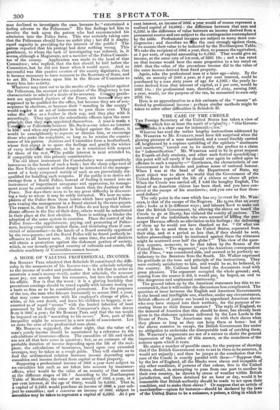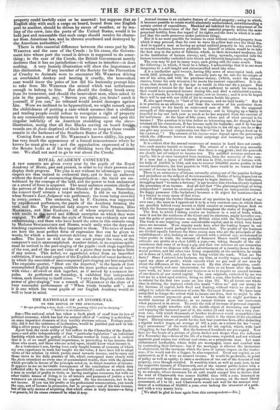THE CASE OF THE CREOLE.
THE Foreign Secretary of the United States has taken a view of which has at least the merit of originality : "this Govern- me inks it a clear case for indemnitieanon."
Whoever has read the rather lengthy instructions addressed by Mr. Wznirrza to Mr. EVERETT must have felt surprised when the glowing pictures of a man murdered, and a vessel forcibly carried off, heightened by a copious sprinkling of the epithets "mutineers and murderers," turned out to be merely the preface to a claim for "indemnification." Mr. WEBSTER used to be in great request for Fourth-of-July orations, and other such festival speechifying : this point will tell rarely if he should ever again be called upon to officiate in such a capacity—" Gentlemen, the characteristic of our Government is its delicate and jealous sense of national honour. When I was at the head of the Department of State, my great object was to show the world that the Government of the United States regarded the life of a citizen as above all price. When the Creole was carried off, I told the haughty English, The blood of an American citizen has been shed, and you have con- nived at the escape of his murderers ; and you owe us four thou- sand dollars."
The only point in the case which has any interest for Mr. WEB. STER, is that of the escape of the Negrces. He (ins that on every side ; looks at it in different ways ; and labours lard to make out that the British Government, by allowing the slaves on board the Creole to go at liberty, has violated the comity of nations. The detention of the individuals who were accused of killing the pas- senger HEWELL affords no alleviation to his feelings ; the delivering of them up he would not have thanked us for. " Of what use would it be to send them to the United States, separated from their ship, and at a period so late that, if they should be sent, before proceedings could be instituted against them the witnesses might be scattered over half the globe?" This view of the ques- tion appears, moreover, to be that taken by the Senate of the United States. "The argument," says the American correspondent of the Times, "was considered able, and seemed to be perfectly sa- tisfactory to the Senators from the South. Mr. Walker expressed his gratitude at the tone and principle of the instructions. They were entirely satisfactory to him, and would be so, he believed, to the country. Mr. Calhoun had heard the documents read with great pleasure. The argument occupied the whole ground; and, coming from the source it did, it would put, he hoped, an end to this dangerous and unpleasant controversy."
The ground taken up by the American statesmen has this to re- commend it, that it will render the discussions less complicated. The question at issue between the English and American Governments 113 the broad and intelligible one, whether, under any circumstances, British officers of justice are bound to apprehend American slaves who may have strayed into their territory, for the purpose of re- storing them to their former masters ? The reply of England, to the demand of America that this should be done, has already been given in the elaborate opinions delivered by the Law Lords in the House of Peers. The Americans may do with their slaves what they please as long as they can keep them at home : but if the slaves contrive to escape, the British Government lies under no obligation to undertake the disreputable task of catching them. Mr. WEBSTER'S arguments are not of a nature to shake the general impression of the Justice of this answer, or the soundness of the reasons upon which it rests.
He states a number of possible cases, for the purpose of showing that if the British Government were to act in them as he assumes, it would act unjustly; and then he jumps at the conclusion that the case of the Creole is exactly parallel with these—" Suppose that, by the law of England, all the Blacks were slaves and incapable of any other condition, if persons of that colour, free in the United States, should, in attempting to pass from one port to another in their own country, be thrown by stress of weather within British jurisdiction, and there detained for an hour or day, would it be reasonable that British authority should be made to act upon their condition, and to make them slaves ? Or suppose that an article of merchandise—opium for instance—should be declared by the laws of the United States to be a nuisancef a pOiaarly a thing in which no property could lawfully exist or be asserted: but suppose that an English ship with such a cargo on board, bound from one English port to another, should be driven by stress of weather, or by mu- tiny of the crew, into the ports of the United States, would it be held just and reasonable that such cargo should receive its charac- ter from American law, and be thrown overboard and destroyed by the American authorities ? "
There is this essential difference between the cases put by Mr. WEBSTER and the case of the Creole : in his cases, the Govern- ment into whose port the vessel is driven is supposed to do some- thing; in the case of the Creole, the British Government merely declares that it has no jurisdiction—it refuses to interfere—it does nothing. A very homely illustration will show the importance of this distinction. If any member of the Society for the Prevention of Cruelty to Animals were to encounter Mr. WEBSTER driving an overloaded donkey and beating it cruelly, the benevolent man would incur the pains of law did his humanity prompt him to take from Mr. WEBSTER the animal which was unfortunate enough to belong to him. But should the donkey break away from its tormenter, and should the benevolent man, when asked to join in the pursuit, say, " Serves you right, you brute! catch it yourself, if you can," no tribunal would award damages against him. Were we inclined to be hypercritical, we might remark upon the childishness of putting a case which assumes that a civilized and trading people could refuse to recognize a right of property in any commodity merely because it was poisonous ; and upon the singular infelicity of an American stumbling upon the slave- illustration, seeing that all free Blacks serving on board foreign, vessels are de facto deprived of their liberty so long as those vessels remain in the harbours of the Southern States of the Union.
Coming from a man of Mr. WEBSTER'S known ability, his paper has very much the appearance of a formal remonstrance where he knows he must give way : and the approbation expressed of it by the Senate looks as if his way of thinking were the predominant .one. We shall not need to go to war about the Creole.



























 Previous page
Previous page